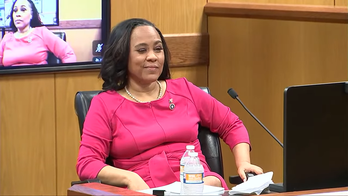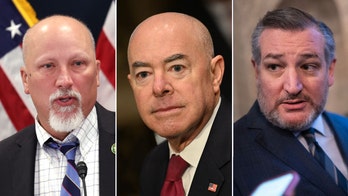Mark McGwire knew better.
Even Tareq and Michaele Salahi knew better.
Apparently Roger Clemens didn't.
If you testify at a Congressional hearing, you'd better tell the truth. Or don't speak at all.
In pitching terms, don't paint the corners. Don't nibble around the black. Don't change speeds. No sliders. No curveballs. No Eephus pitch. And god forbid, no brushbacks or chin music. If you're testifying on Capitol Hill, just hum your answers right down the heart of the plate. Serve up gopher balls. Hang breaking balls. Let the lawmakers whack your pitches out of the park. Answer their questions truthfully, and you'll be fine.
A federal grand jury indicted Clemens for perjury Thursday. More than two years ago, the House Oversight and Government Reform Committee sent the Justice Department a referral which alleged that the seven-time Cy Young Award winner lied to Congress when he testified about using performance enhancing drugs at a February, 2008 hearing.
Clemens was mentioned more than 80 times in a report probing the use of steroids and performance enhancing drugs compiled by Former Senate Majority Leader George Mitchell,D-Maine.
Particularly vexing were countervailing depositions given to Mitchell and Congress by Clemens and his former trainer Brian McNamee. Clemens contended he never used any performance enhancing substances. McNamee alleged he injected Clemens with steroids and human growth hormone (HGH) more than 20 times over a three-year period. McNamee even presented federal investigators some of the syringes he purportedly used to inject Clemens and gauze sullied with Clemens' blood.
Granted, an indictment isn't a conviction. But Clemens is definitely behind in the count.
"Clemens made statements that we know are untrue," said Rep. Henry Waxman, D-Calif., who presided over the 2008 hearing.
What's interesting is that Clemens didn't have to testify at a Congressional hearing at all. Clemens insisted that Waxman call the hearing in an effort to clear his name.
Clemens is a battler. When stuck with a bases-loaded jam and the manager visits the mound, intent on sending him to the showers, Clemens might cajole the skipper to leave him in the game.
Which is precisely what Clemens did by demanding the 2008 forum.
"Someone isn't telling the truth," argued Waxman at the hearing. "If Mr. McNamee is lying, then he has acted inexcusably and he has made Mr. Clemens an innocent victim. If Mr. Clemens isn't telling the truth, then he has acted shamefully and has smeared Mr. McNamee. I don't think there's anything in between."
And here's the strange part. Clemens wanted to make his case in public. But he even testified that the exercise was futile.
"I have never taken steroids or HGH," said a defiant Clemens. "No matter what we discuss here today, I am never going to have my name restored."
Clemens was right about that. The hearing didn't restore his name. His insistence on testifying placed him in legal jeopardy.
"After we had completed our depositions, my instinct was to cancel this hearing and issue a written report," said Waxman in his opening statement at the hearing. "But others had different views. And I was particularly influenced by the view of Mr. Clemens' attorneys, who thought it would be unfair if the committee issued a report without giving Mr. Clemens the opportunity to testify in public."
And lawmakers got the better of Clemens.
"It's hard to believe you, sir," said Rep. Elijah Cummings, D-Md. "I hate to say that. You're one of my heroes. But it's hard to believe you."
Lawmakers didn't believe Clemens, which led to the perjury referral But Congress wasn't given the opportunity to craft such a referral at two other high-profile hearings.
On March 17, 2005, a "Murderer's Row" of baseball's best, squirmed awkwardly at the witness table in the Rayburn House Office Building: Rafael Palmeiro, Sammy Sosa, Curt Schilling, Jose Canseco, and Mark McGwire.
But nearly everyone trained their attention on McGwire.
The slugger entered the hearing room a shadow of his former, Colossus self. A few years before, McGwire demolished Roger Maris's record for home runs in a season. That season, McGwire's physique resembled a ripped Marvel comics super hero drawn by Stan Lee. McGwire resembled a deflated balloon when he appeared in 2005.
Deflated or not, McGwire repeatedly declined to answer lawmakers questions about whether he took steroids during his historic, 70 home run season in 1998.
"I'm not here to talk about the past. I'm here to be positive about this subject," was McGwire's refrain.
McGwire even dodged a question as to whether using steroids broke the rules.
"That's not for me to determine," he said.
Earlier this year, McGwire admitted he used performance-enhancing drugs.
But on that day in 2005, McGwire never incriminated himself. He never issued an emphatic denial like Clemens. And he didn't prompt Congress to suspect he committed perjury.
By evading lawmakers' questions, Mark McGwire convinced many fans that he used steroids while playing. Had the steroid cloud not loomed over McGwire's career, his 583 home runs would have enshrined him in Cooperstown during his first year of eligibility. Instead, Hall of Fame voters didn't even name McGwire on a quarter of their ballots. A player requires recognition on 75 percent of all ballots to secure election to the Hall.
"If a player answers ‘No,' he simply will not be believed. If he answers ‘Yes,' he risks public scorn and endless government investigations," McGwire said presciently during his Congressional testimony.
It's unclear if McGwire will ever make it to Cooperstown. But he won't make it before a grand jury.
Two other big-time witnesses also ducked the wrath of Congress and the Justice Department. In January, the House Homeland Security Committee subpoenaed "Real Housewives of DC" stars Tareq and Michaele Salahi to testify about how they crashed last fall's White House state dinner. At first, the Salahis completely skipped one hearing where they were invited to attend. That prompted the panel to compel them to appear via subpoena, lest they be held in contempt of Congress.
The Salahis showed on that occasion. But contributed virtually nothing. The couple declined to answer virtually any question posed by lawmakers. On 31 occasions, they cited their Fifth Amendment rights against self-incrimination.
Tareq Salahi announced the couple's lawyers would be happy to speak to the committee once they were out of legal trouble.
"It's not going to come from our voices," he said.
That ignited the ire of dozens of lawmakers.
"I don't respect your right to take the Fifth Amendment. Not at all," scolded Rep. Bill Pascrell, D-N.J.
The Salahis are noted for their flashy get-ups, splashy soirees and jet-setting trips to Europe. Not their legal acumen. But when faced with tough questions before Congress, the Salahis were reticent.
Roger Clemens was not.
"The Constitution protects fools. The Constitution protects stupidity. The Constitution protects errant thought," said Rep. Dan Lungren, R-Calif., of the Salahis' decision to invoke the Fifth. "Thank God it does."
A lesson that was perhaps lost on Clemens.
In the closing seconds of the February 2008 hearing, Clemens could barely contain himself. Henry Waxman rattled through many of the allegations made by Brian McNamee that he helped Clemens shoot up.
Clemens tried to get in a word edgewise.
"That does not mean that (McNamee) was not mistaken sir," Clemens interrupted, trying to shout down Waxman from the witness table.
With a sharp stroke, Waxman rapped his gavel to signal that the most-decorated pitcher in Major League history crossed the line of Congressional decorum.
"Excuse me, but this is not your time to argue with me," shot Waxman at Clemens.
It wasn't Clemens' time to argue with Waxman. In fact, many legal scholars may now suggest it wasn't Clemens' time to speak at all.




